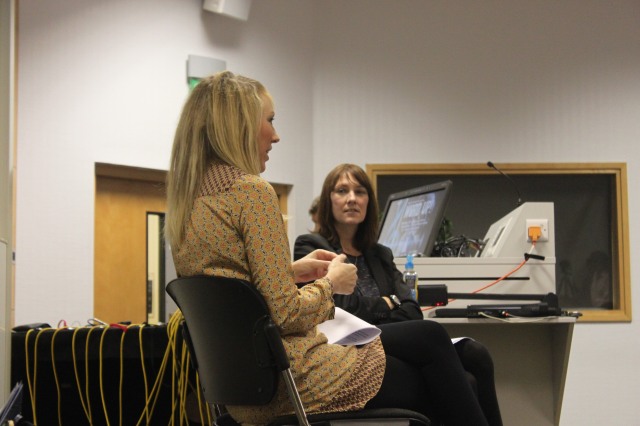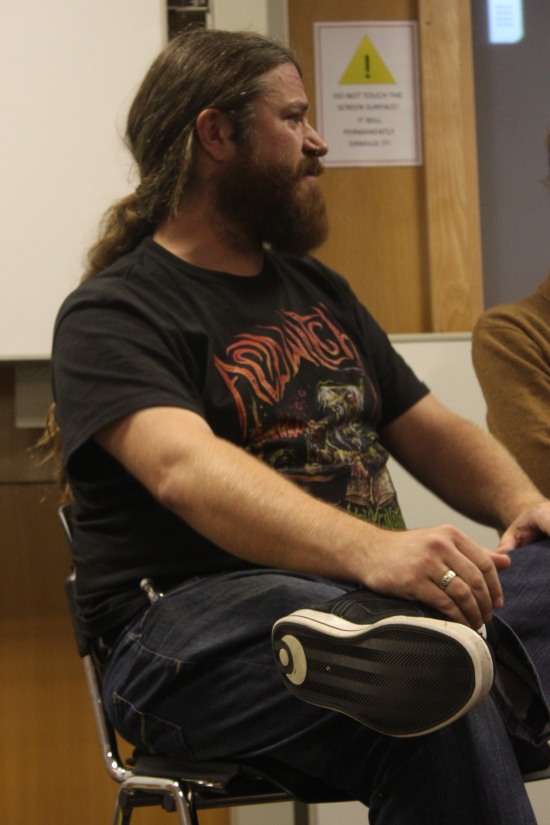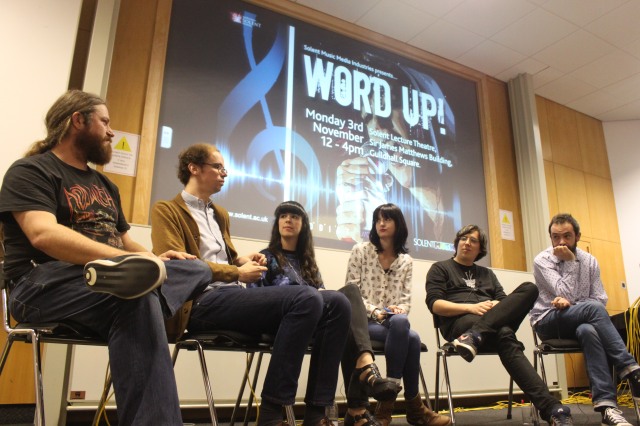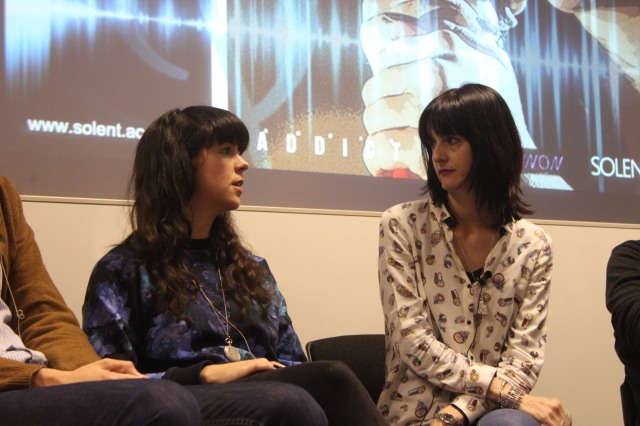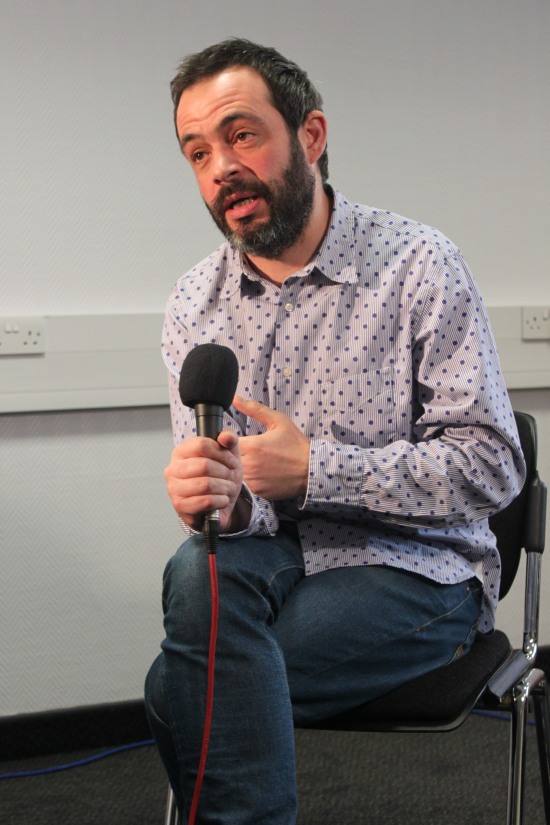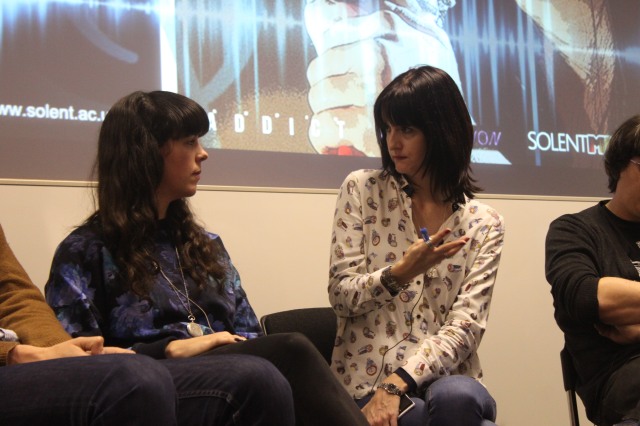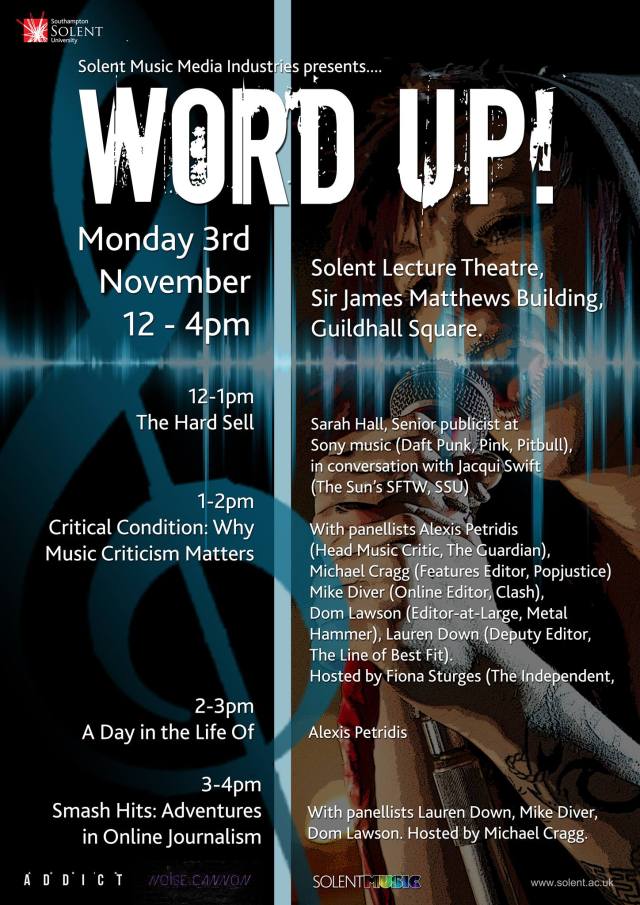11:30am
Kicking off the day is Senior Publicist Anna Mears in conversation with Ruth Barnes
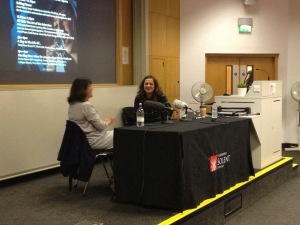
11:40am
“I’m not Rihanna’s arse double”– Anna Mears
11:45am
Anna has worked with Enya, Green Day and Madonna.
11:50am
“I love holding chickens” – Ruth Barnes
11:55am
“The publicist’s role in breakthrough artists is key. It’s a difficult job for a PR to convince a journalist about a band they don’t like.”- Anna Mears
“Independent press means that you really get to push the bands that need it.” -Anna Mears
11:57am
“There’s still journalists out there who won’t talk to me” – Anna Mears
11:58am
“Journalists hate being told ‘Oh it’s a grower!'” -Anna Mears
12:00pm
“There are two ways of being a PR- some are really protective of their acts but the best way is to let the journalist and the photographer do their job and develop a good relationship” – Anna Mears
“You have to pick your targets- it’s not manipulative, but it’s strategic” – Anna Mears
“To be a good publicist and to get people to listen to your music, it takes a long time to build up trust. Hopefully you can carve out a niche for yourself”– Anna Mears
12:02pm
“If you really believe in something and you can put it in the right context, people will see things differently” – Anna Mears
Anna says it feels like there is getting to be more and more music out there.
12:03pm
Talk turns to the relevance of the album in the current climate of the music industry
“It’s really tough because there’s so much music out there so getting a journalist to sit down and listen to a record 6, 7, 8 times is hard. “People still want to see a body of work from certain artists” – Anna Mears
12:04pm
Ruth asks the audience if they have any favourite memorable PR stunts.
Ruth checks that everybody actually knows who John and Yoko are.
12:08pm
“These days you just want everything to go viral” – Ruth Barnes
12:09pm
Ruth asks what Anna would put in a press pack.
12:10pm
“All the good stuff, you put in a press pack” – Anna Mears
12:11pm
“We get journalists to write press releases for us because [PRs] can’t write” – Anna Mears
12:12pm
“When we send an album out to journalists, we send it with a press release- that a journalist has written. You can have a great album but if there’s no context, it’s hard for people to get their heads round it” -Anna Mears
12:13pm
“I don’t even know if anyone reads press releases- do they?!” – Anna Mears
12:14pm
Fiona, Ruth and Anna agree that people only read press releases depending on who sent them.
12:15pm
“I feel like there are bands who shouldn’t be having their wares peddled by bad PRs when somebody needs to step in and make them wait” – Anna Mears
12:16pm
“I don’t think they are important but unfortunately everyone else does, that’s what radio and major labels take into account” – Anna Mears on the relevance of Youtube figures in press releases
12:18pm
Fiona is lamenting being asked by PRs to write about weddings.
12:21pm
Anna remembers helping Laura Snapes with a student project while she was a budding journalist.
12:25pm
Ruth asks if anyone is inspired by what they’ve heard today. There is a deafening silence.
12:30pm
“A lot of my life is navigating awkward moments and trying to make a joke out of it”– Anna Mears
12:45pm
Next up we have Dorian Lynskey (The Guardian, Q Magazine), Jean-Luc Brouard (The Independent, Fault Magazine), Anna Mears and Ruth Barnes chatting about ‘The Art of the Interview’ with Fiona Sturges hosting.
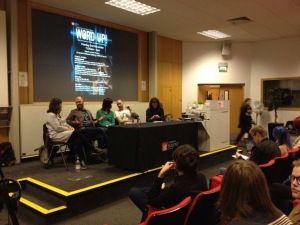
12:53pm
“I sometimes feel like in Britain, in most places, you are doing it with one hand tied behind your back, because it’s just taking what you get in an hour.” – Dorian Lynskey
12:57pm
Fiona asks the panel how they approach interviews when the subject is a “grumpy shit”.
12:59pm
Ruth Barnes impersonates Italian and German journalists. The German journalist sounds a lot like the Italian journalist.
13:00pm
On interviewing Russell Crowe, Ruth claims he wanted to talk about anything but Robin Hood.
13:04pm
Fiona questions Jean-Luc on journo-photographer relationships and Anna states that, as a PR, “shoots are one of the most delicate things we have to do”.
“What I try and do is give the photographer the most amount of time possible” – Anna Mears
13:05pm
Fiona reiterates that you shouldn’t be a d***. Everyone seems to agree it’s the best interview advice.
“‘You have to see your subject as an equal.” – Fiona Sturges
13:06pm
“Kanye West is the oddest person I’ve ever met… who’s not actually been diagnosed with a condition.” – Dorian Lynskey
13:09pm
When interviewing artists, Dorian says that “you want to get across that you like their stuff and that you’ve done your research.”
13:11pm
Alice Cooper “smells like talc” and is “so up for talking about golf.” – Ruth Barnes
13:13pm
“You have to shut up in interviews- it’s the art of communicating, using just your face so you have a nice clean recording.” – Ruth Barnes on radio interviews
13:15pm
The panel discuss the right and wrong ways to utilise pre-determined questions in interviews. Ruth and Dorian stress the importance of not just sticking to your notes.
“They just dropped a bombshell that they are leaving their record label, and you’re like ‘so whats the album like?'” Ruth on sticking to a question list, and missing important points in doing so.
“When you pause, they sometimes fill in the gap with more interesting stuff” – Dorian Lynskey
13:17pm
Fiona asks about editors’ agendas.
“‘Ask about the miscarriage!’ And you’re like “uh, really?!” – Fiona Sturges
13:19pm
Anna Mears discusses dressing Weezer as a cult for a cover shoot.
13:21pm
“If it’s not working, there is no point persevering for an hour and a half and destroying any relationship you’ve got.” – Jean-Luc Brouard
“You want to support both the editor and the photographer, and it’s tricky”– Anna on liasing at photo shoots.
13:22pm
Weezer refused to retweet the cult cover photo as they hated it.
13:25pm
“Often the thing PRs don’t want you to ask their artists are the least interesting anyway.” – Dorian Lynskey
13:27pm
On asking intrusive questions: “Sometimes you just think, ‘You know what, this is none of my business.'” – Dorian Lynskey
13:30pm
Ruth gives an example of an interview at Glastonbury where she “died a living death”…
“I’d been asked to interview Ian from The Lightning Seeds, one of the nicest guys in music.”
13:31pm
As Ian Broudie came off stage, Ruth asked him why they never played ‘Three Lions’. Turned out they did and she missed it. Whoops.
13:34pm
The panel ask for any questions.
On discussing a journalism degree, Dorian quips, “Are you still in the trial period?”
13:36pm
If you want to get into radio, Ruth’s advice is to start at your local station by answering the phones.
13:37pm
The panel discuss the value of journalism degree courses.
13:38pm
“I haven’t got a real job, I just do photos.” – Jean-Luc
As a final piece of advice, Jean-Luc says: “Don’t worry if you’re interviewing someone famous, they’re basically just you 20-30 years down the line.”
14:00pm
14.1opm
Beez (Terry Bezer) of Metal Hammer and Scuzz TV fame, has taken to the stage.
14.11pm
Beez opens the floor up to questions.
14.14pm
When asked how he makes money in journalism, he says “if money is your motivation, go and be an accountant”. Yikes.
“Whilst getting into mainstream media is good for exposure, if you’re in this for money then this is not your game”
14:25pm
“The business at large is not good at listening”
14:28pm
Beez explains that unfortunately, “in the business there’s a genuine perception that new writers suck.”
“We are crying out for new opinions”
14:30pm
Beez discusses his opinion that it has never been easier for young writers to make an impact, stating that “personality is missing” from music.
14:31pm
Beez states that the industry needs shaking up, “especially in this day and age when you can do everything yourself.”
14:33pm
Terry discusses his opinion of Download festival headliners. When discussing the re-hashing of the same old headliners, he compares it to “a monkey with an N64 cartridge, banging it into the front of a PS4 and wondering why it won’t play”
14:37pm
Beez is a big wrestling fan, and warns that there may be a few wrestling references in his answers.
14:38pm
“If you dont roll with the punches, then what are you gonna do? All these big headline bands, 7-8 years they won’t be around then.”
14:40pm
Trivium’s latest album, Beez says, was a “massive steaming pile of turd” yet his negative review was canned.
14:42pm
Beez questions, “Does the media have a role anymore?” He believes so, stating that “you can have success whilst not kissing arse.”
14:44pm
Beez was offered the job at Scuzz whilst heavily intoxicated at Hevy Fest.
14:45pm
Beez is “trying to set fire” to the music press. He asks who in the crowd has faith in the music press, and only two people raise their hands.
14:47pm
Beez rates the level of influence that Kerrang! have, explaining that Pierce The Veil were B-listed on Radio 1 purely because of the amount of nominations they had at the Kerrang! Awards
14:50pm
Beez believes “awards shows are cash-grabs.”
“Award shows are a total load of b*llocks”
14:54pm
Beez is a self-proclaimed “sh*t-head”
14:55pm
“I ask if you have faith in the music industry and none of you put your hands up, but you want to be part of it. Why?”
14:57pm
Beez says anyone can start their own publication to change the industry “Change has never been more possible”
14:58pm
Changing the way the industry runs “takes b******s. Rock media is rotten to the core.”
14:59pm
Beez praises Radio 1 Rock Show for its role in rock media and exposing bands. “Daniel P Carter is a man to believe in.”
15:01pm
Back onto recycled headliners – “Do you really need to hear Sweet Child O’ Mine ever again?”
15:03pm
“Successful people listen to their audience, they are the ones you live and die on.”
15:05pm
Beez’s says his goal is to “stand over the bones of mainstream media with That’s Not Metal”
“You can shovel shit, or you can do what you believe in.”
15.12pm
It’s time for the final panel of the afternoon- Everett True (Rejected Unknown), Beez, Emma Swann (DIY Magazine) and Solent’s own Mike Diver are here to talk ‘launching new media platforms’.
15.16pm
Mike Diver is denied permission to refer to Everett as ‘a literal legend’.
Everett lists all the publications that don’t want him or have fired him over the years.
Everett tells it like it is: “The NME said I couldn’t write and that I was lazy, so I went to Melody maker, they loved people like that”
15.20pm
Mike is forced to clarify that the panel does not condone the burning down of houses following a particularly inflammatory comment from Everett.
“I’ve always been a total mediocre failure“- Everett. Obvs.
15.27pm
Talk turns to DIY magazine.
“The kids now have got it so easy- you can set up a new thing in an afternoon and there it is!”- Emma Swann, discussing the origins of DIY.
“I didn’t know anything about music journalism when I started DIY- or music, in fact, probably. It was just something to do because I hated my uni course“- Emma
15.29PM
The panel discuss the market for physical music products.
“DIY going into print has coincided with kids buying vinyl- they want a physical product“- Emma
15.34pm
Talk has turned to Everett’s series of projects.
“You can just keep f*cking with the medium all you want, I love that.“- Everett on web journalism
15.37pm
Everett tells all Australians in the room to f*ck off.
Everett on Rejected Unknown- “We’re making it up as we go along. Pay on demand is what I’ve been waiting for all my life. I would’ve loved that when I was doing a magazine. It’s opened up a lot of options in print, for me at least”.
15.42pm
Beez- “If you’re thinking about something that doesn’t exist, go and make it exist”
“A good idea that you really believe in is worth chasing. Always“- More words of wisdom from Beez.
15.44pm
The panel discuss the first pieces of free music they received from PRs.
Emma’s was Franz Ferdinand’s first single, Everett’s was Depeche Mode’s first single.
Mike concludes that Everett wins this particular contest.
15.47pm
Emma says she still doesn’t feel ‘part of’ the music industry as a whole- “I still am surprised when somebody knows about DIY that I don’t know!”
15.49pm
“I have pissed off everybody there is to piss off in the rock media. I’m the black sheep and f*ck them” says Beez.”That’s Not Metal was a total last roll of the dice”
15.52pm
“Go for it, but don’t worry what else is out there, because if you believe in what you are doing then it doesn’t matter“- Emma
Everett tells the audience to ‘get desperate’.
Everett tells the audience to get more desperate, because they aren’t desperate enough.
15.55pm
“I was the weird kid at the front with a plastic bag dancing to everything, so the NME took me on“- Everett
Everett continues- “I couldn’t string a sentence together, so I just used loads of exclamation marks. My reviews couldn’t be cut, because they made no sense.”
15.58pm
Emma says that twitter is ‘golden’ for starting out with a new publication and getting exposure.
16.00pm
“I do creepy videos of myself- you don’t want to see them”– Everett
16.09pm
“Radio X. FFS“- Fiona
“These publications have an anti-women gender bias. I am told I have a gender bias because I like music by women. Rock music as a male construct is seen as more authentic, which is bullshit. There is a huge anti-women gender bias in the music industry.“- Everett



